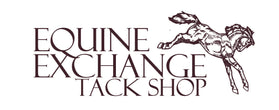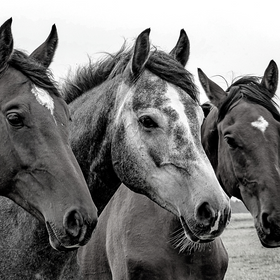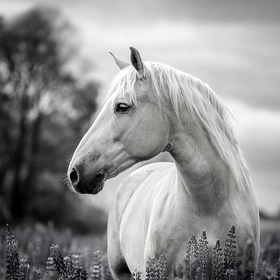
Ways to Increase Your Horse's Calories This Winter
Horses are large animals that demand a steady supply of calories. These calories give the horse energy, maintain body weight, and even keep warm.
Each horse’s caloric needs are different. Breed, weight, age, and activity level are all factors to consider when determining your horse’s caloric needs. The average adult horse needs approximately 20 Mcal (mega calories) daily to support daily activities and maintain weight. You can adjust this number with your veterinarian to help your horse gain or lose weight.
It is best to feed your horse calories with value. Empty calories will lead to nutrient deficiencies, issues with the digestive tract, and lower energy. Always offer high-quality forage. This is your horse’s number one source of calories. Forage provides fiber, which is essential for your horse. Finally, you can supplement with grains, feeds, and other supplements to reach the calorie requirement.
Importance of Increasing Calories in Winter
The winter months bring cold weather, which can be extreme depending on your location. Your horse’s body will adapt to this temperature change, but there are several things you can do to help him thrive during those bitter months.
Cold weather makes it challenging to maintain weight and even condition well. Frigid air is terrible for muscles, joints, and ligaments during exercise. Cold weather also dramatically reduces the availability of forage. Without it, your horse needs a supplement to balance calorie needs.
As shown above, horses need calories for body weight, energy, and keeping warm. That need to stay warm increases in the winter months. Your horse's immune system will weaken without a well-maintained body weight and temperature.
Balancing Diet for Increased Calories
High Fat Feeds
In winter, you can add high-fat feeds to your horse's diet. These feeds help increase caloric intake with healthy fats and are also a good energy source.
- Rice bran
- Soybean oil
- Flaxseed
High Fiber Feeds
High-fiber feeds provide the benefits of high-fat feeds but do not provide large energy jumps. These feeds are closely related to forage and provide long-lasting energy.
- Alfalfa hay
- Timothy hay
- Beet pulp
Protein-Rich Feeds
Protein-rich feeds are another great option that will also promote muscle development.
- Soybean meal
- Alfalfa hay
- Peas
Supplementing the Diet
Oil Supplements
Oil supplements are very similar to high-fat feeds. Oil is high in fat, which carries more calories. You can add vegetable, corn, soybean, and several other oils. One thing to note is to add it slowly. Oil supplements are known to upset the digestive tract if introduced too quickly.
Calorie Dense Supplements
Calorie-dense supplements are just that: high-calorie! These supplements come in many forms, such as liquids, powders, and pellets. They closely mirror the benefits of high-fiber feeds. Just keep in mind to choose one that is low in sugar.





